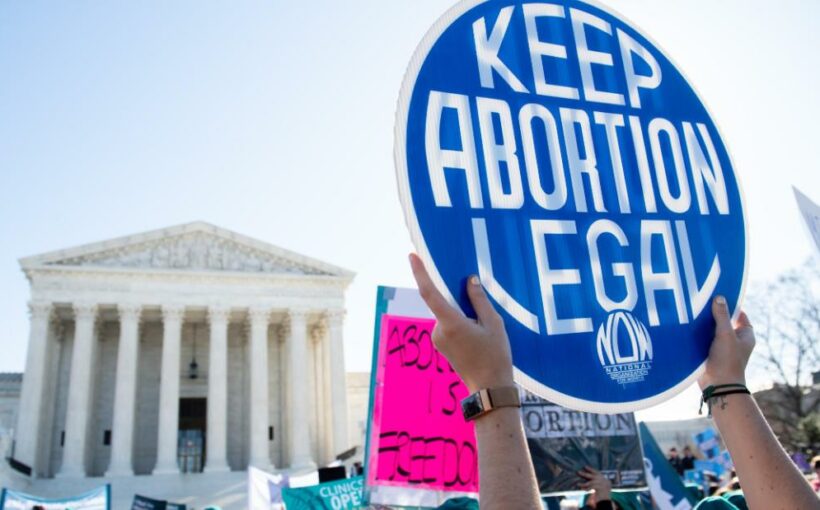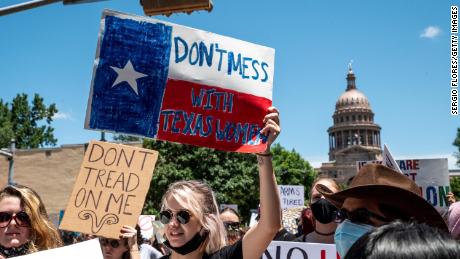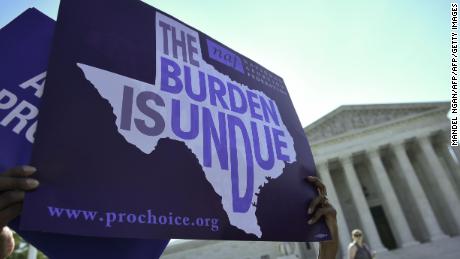(CNN)The Supreme Court formally denied a request from Texas abortion providers to freeze a state law that bars abortions after six weeks. Chief Justice John Roberts joined the three liberal justices in dissent.
The court’s move means that the law — which is one of the strictest in the nation and bans abortion before many people know they are pregnant — will remain on the books.
The law allows private citizens to bring civil suits against anyone who assists a pregnant person seeking an abortion in violation of the ban.
In an unsigned opinion, the majority wrote that while the clinics had raised “serious questions regarding the constitutionality of the Texas law,” they had not met a burden that would allow the court to block it at this time due to “complex” and “novel” procedural questions.
The majority stressed that it had not formed a conclusion about the constitutionality of the law — despite the order coming nearly 24 hours after the law, the tightest abortion restrictions since the 1973 landmark Roe v. Wade, took effect.
“In particular, this order is not based on any conclusion about the constitutionality of Texas’s law, and in no way limits other procedurally proper challenges to the Texas law, including in Texas state courts,” the majority wrote.
There were several dissents. In one, Justice Sonia Sotomayor, joined by her two liberal colleagues, called the majority’s order “stunning.”
“Presented with an application to enjoin a flagrantly unconstitutional law engineered to prohibit women from exercising their constitutional rights and evade judicial scrutiny, a majority of Justices have opted to bury their heads in the sand,” Sotomayor wrote.
“No federal appellate court has upheld such a comprehensive prohibition on abortions before viability under current law,” she wrote. “Taken together, the Act is a breathtaking act of defiance — of the Constitution, of this Court’s precedents, and of the rights of women seeking abortions throughout Texas.”
Under normal circumstances a dissenting justice “respectfully dissents.” Sotomayor simply wrote, “I dissent” — revealing her deep frustration.
“The Court should not be so content to ignore its constitutional obligations to protect not only the rights of women, but also the sanctity of its precedents and of the rule of law, ” she said.
Justice Stephen Breyer also omitted the “respectfully” from his dissent.
After it took effect early Wednesday morning, clinics across Texas drastically limited their services. Whole Woman’s Health, which operates four clinics in Texas, said it is offering abortion services “only if no embryonic or fetal cardiac activity is detected in the sonogram,” according to a spokesperson, and several other providers also are taking that limited approach.
RELATED: How Texas’ 6-week abortion ban will make accessing the procedure nearly impossible for some
Roberts dissents, says court needed more time
Roberts said that he voted to block the law for now to give the court more time to consider the unusual statute.
Roberts said that the state Legislature had imposed a “prohibition on abortions after roughly six weeks” and then “essentially delegated enforcement of that prohibition to the populace at large” with the consequence of insulating the state from the responsibility of enforcing the law.
The law was designed to make it much more difficult to bring a pre-enforcement challenge because there are not the usual government officials to hold accountable in court.
The law allows any person — as long as they’re not a government official — to bring a civil lawsuit in state court against a provider accused of violating the ban, regardless of whether the person bringing the lawsuit has any connection to the abortion being sought. If they prevail, they are entitled to at least $10,000 in damages, and the law is structured to make it especially costly for clinics that are targeted with an enforcement action. It prohibits clinics from recouping attorneys’ fees from their court foes, even if a judge sides with the provider in the lawsuit. The measure also prevents clinics from seeking to transfer the cases to venues more convenient for them, unless they have the agreement of their opponents.
President Joe Biden on Thursday called the law’s novel enforcement structure a “bizarre scheme” with the potential to unleash “unconstitutional chaos.”
“Complete strangers will now be empowered to inject themselves in the most private and personal health decisions faced by women,” he said.
Biden said he was launching a “whole of government” effort to respond to the law, tasking the Department of Health and Human Services and the Justice Department “to see what steps the Federal Government can take to ensure that women in Texas have access to safe and legal abortions.”
Future of Roe v. Wade
But by letting the law take effect, the conservative majority may already have tipped its hand on whether it is poised to reverse or at least undercut Roe v. Wade, the ruling that declared women’s constitutional right to end a pregnancy.
Roberts’ dissent likely signals the divisions to come.
“Alone among the conservatives, Chief Justice Roberts calls out the Texas law for what it is — a transparent attempt not just to undermine Roe, but to make it hard for such a restriction to be blocked,” said Steve Vladeck, CNN Supreme Court analyst and professor at the University of Texas School of Law.
“It’s a pretty powerful sign that he, at least, is not ready to overrule Roe,” Vladeck added. “But the million-dollar question that the 5-4 vote raises is whether, when the time comes, any of the other conservatives will join him.”
Key conservatives such as Justice Clarence Thomas have not been shy in the past to vociferously express their opinion on the court’s abortion docket. In 2019, Thomas, who has publicly said Roe was wrongly decided, declared that abortion jurisprudence has “spiraled out of control.” And last year, Justice Neil Gorsuch did not mince his words about the court and abortion, saying: “We have lost our way.”
All three of President Donald Trump’s appointees — Gorsuch, Brett Kavanaugh and Amy Coney Barrett — voted with the majority to let the Texas law remain in effect.
This story has been updated with additional details.
Source: Read Full Article



